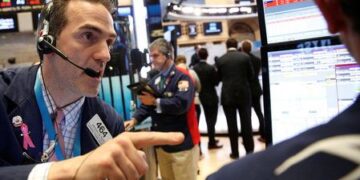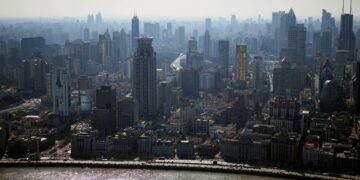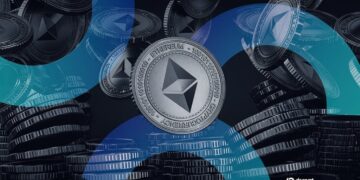Trump and Powell on Collision Course Without Easy Escape; ECB Cuts Rates to Counter Tariff Threat By Vicky Ge Huang
President Trump is threatening to fire Federal Reserve Chair Jerome Powell unless he cuts interest rates to cushion the blow from his tariffs.
Can the president fire the chair of the Fed? According to the central bank’s current chair, Jerome Powell, the answer is no. “Our independence is a matter of law,” Powell said on Wednesday.
The European Central Bank cut rates on Thursday to offset the economic blow of tariffs, a move that drew the attention of President Trump, who earlier urged the Fed to follow the ECB with rate cuts of its own.
And Turkey’s central bank raised its key interest rate Thursday, reversing a previous course of rate reductions as political conflict threatens to stymie the bank’s efforts to tame high inflation.
Top News Trump and Powell on Collision Course Without Easy Escape
It isn’t clear the President Trump has the legal authority to dismiss Federal Reserve Chair Jerome Powell before his term ends next year. And Trump’s trade war has made rate cuts more difficult for now because the Fed fears acting to shore up the economy could worsen inflation.
That tension has left the two men on a collision course without any easy escape -unless Trump backs down on tariffs or until the economy shows signs it is crumpling under the weight of the import duties.
Trump Has for Months Privately Discussed Firing Fed Chair Powell Trump Lashes Out at Powell, Says ‘Termination Cannot Come Fast Enough’ Can Trump Fire Jerome Powell? Fed Officials Still Resisting Pressure to Cut Rates
A top U.S. central bank official pushed back on calls from President Donald Trump and others for a quick interest-rate cut, saying the Federal Reserve’s benchmark rate was in a good place for the time being. “I don’t see any need to change the setting of the fed-funds rate anytime soon,” New York Fed President John Williams said in an interview on the Fox Business Network. (MarketWatch)
Chicago Fed Research Director Will Lead Philadelphia Fed
Anna Paulson, a senior economist at the Chicago Fed, will become the next president of the Federal Reserve Bank of Philadelphia , the bank said Thursday. The Philadelphia Fed president has a turn voting on the Fed’s rate-setting committee next year.
ECB Cuts Interest Rates to Counter Threat From Trump Tariffs
The ECB on Thursday lowered its key interest rate to 2.25% from 2.5% , its seventh cut in eight meetings, taking borrowing costs to their lowest level since early 2023. The move increases the gap between rates in Europe and the U.S. to over 2 percentage points, the widest in two years.
Barring a Trump Move, Central Banks Could Go Separate Ways Turkish Central Bank Hikes Rates
Turkey’s central bank said it will raise its one-week repo rate to 46% from 42.5% previously. It had been expected to keep rates on hold, according to economists polled by FactSet.
U.S. Economy Americans Worry Over Negative Impact of China Tariffs
As a trade war with Beijing heats up, a new survey shows Americans view bilateral economic ties as less beneficial to the U.S. than China but also hold skeptical views about addressing the relationship with tariffs.
U.S. Moves Ahead With Plan to Charge Fees on Chinese Ships
The U.S. is moving forward with a plan to charge fees on Chinese ships calling at American ports, part of the Trump administration’s effort to counter China’s dominance in ocean shipping and revive the domestic maritime industry.
Out of the Tariff Turmoil, a Few Winners Emerge
Most businesses are struggling to respond to President Trump’s tariff blitz, but higher trade barriers are creating opportunities for some small U.S. companies .
The Home-Building Season Is Starting Off Badly, New Data Shows
The spring home-building season is off to a rocky start. Housing starts, a measure of home construction, dropped 11.4% in March from February , according to new Census Bureau data. That marked the steepest plunge in a year.
Jobless Claims Fall to Two-Month Low
If the stress of trade wars starts to pressure the U.S. economy, one of the first signs is likely to be an increase in layoffs and unemployment. Yet so far there’s no evidence the labor market is suffering.
The number of people who applied for unemployment benefits last week fell by 9,000 to 215,000 and matched a two-month low, the government said Thursday, leaving it at a remarkably low level. (MarketWatch)
Tourists Are Avoiding the U.S. It’s a Problem for the Oil Market.
Tourists no longer want to come to the U.S., and it isn’t just hurting hotel bookings. The decline is starting to show up in oil-demand data, according to J.P. Morgan. Travel to the U.S. fell 11.6% in March from the year before, according to the International Trade Administration. Goldman Sachs has estimated that the drop in tourism could reduce GDP by as much as 0.3%, or about $90 billion, in a worst-case scenario. (Barron’s)
Financial Regulation Trump Media Asks SEC to Probe Alleged Suspicious Trading Activity
President Trump’s media company asked financial regulators to investigate alleged suspicious trading activity in its stock. The company behind Truth Social says the allegedly suspicious trading activity is tied to U.K.-based hedge fund Qube Research & Technologies.
Forward Guidance Friday (U.S. stock markets closed on Good Friday)
10 a.m.: State Employment and Unemployment
11 a.m.: FRB San Francisco President Mary Daly speaks at UC Berkeley’s Fisher Center for Real Estate & Urban Economics event
Monday
9 a.m.: G24 Deputies Meeting
10 a.m.: Leading Indicators
Research Tariff Uncertainty Pushes U.S. Residents to Cancel Plans for Major Purchases
Nearly one in four U.S. residents are canceling plans to make a major purchase, such as a home or a car, because of President Trump’s new tariff policies, according to a Redfin survey. An additional one in three are delaying plans to make a major purchase. Nearly one in 10 survey respondents said they’re planning to make a major purchase sooner than expected, while 8% said they already made a major purchase sooner than expected. The new tariffs are likely to impact the housing market in a number of ways. They have already sent mortgage rates on up-and-down swings, and they’re likely to significantly increase construction costs. Tariffs and broader economic uncertainty are also pushing down homebuying demand and cutting into buyers’ budgets. – Chris Wack
Japan March CPI Results Support Bank of Japan’s Economic View
Japan’s solid consumer price figures for March likely support the Bank of Japan’s view that domestic price conditions are in line with its outlook, says Mizuho Securities economist Ryosuke Katagi. BOJ Gov. Kazuo Ueda reiterated Thursday that the central bank would raise interest rates further if the economy and prices align with its projections. Rice prices, one of the major reasons for recent consumer price growth, jumped 92.1% in March from a year earlier, versus February’s 80.9% rise. Meanwhile, energy prices are likely to remain volatile because the government is expected to reintroduce subsidies for electricity and gas in the summer, Katagi says. – Megumi Fujikawa
Basis Points Former Securities and Exchange Commission Chairman Gary Gensler said President Trump’s aggressive tariff strategy of negotiating with dozens of countries in 90 days is a “self-inflicted injury.” The global economy will grow more slowly as a result of the tariffs imposed by U.S. President Trump and counter measures taken by other countries, but it will avoid a recession, the head of the International Monetary Fund said Thursday. Avoiding a trade war is simple, say some economists: Just don’t fight back. So far, that strategy appears to be paying off for much of the world, with President Trump pausing some of his highest across-the-board tariffs for three months. China’s No. 2 official is urging authorities to roll out forceful policy support , state media say, as signs of economic stress emerge from Beijing’s trade battle with the U.S. Japan’s core consumer inflation grew at a faster pace in March because of a rise in food prices, helping the Bank of Japan make a case for further interest-rate increases despite tariff concerns. Executive Insights
Here is our weekly roundup of stories from across WSJ Pro that we think you’ll find useful.
President Trump wants to rapidly revive the U.S.’s commercial shipping fleet as a matter of national security. America doesn’t have enough sailors to do it .
Nuclear energy is hot again. Can AI help manage the power plants?
U.S. private-equity exits and their total value rose in the first quarter from a year ago, but recent market volatility puts that momentum at risk.
J.M. Smucker, the owner of Hostess baked goods like Twinkies and Ding Dongs, is courting a new group of snackers : stoners.
About Us
WSJ Pro Central Banking brings you central banking news, analysis and insights from WSJ’s global team of reporters and editors. This newsletter was compiled by markets reporter Vicky Ge Huang in New York. Send your tips, suggestions and feedback to [[email protected]].
This article is a text version of a Wall Street Journal newsletter published earlier today.
(END) Dow Jones Newswires
04-18-25 0721ET
















